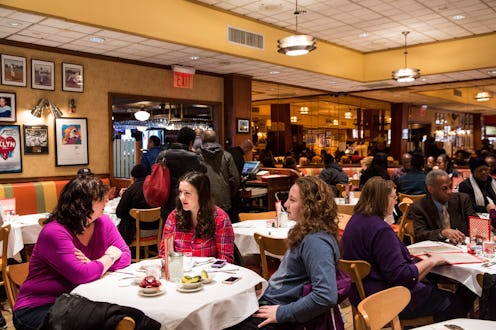Have you ever noticed that when the people around you are chowing down on party snacks, you don't feel bad about following suit, but when they're being circumspect about their food intake, you don't want to be the odd one (pigging) out? If not, power to you: You are officially immune to peer pressure. But for the majority of us, the people around us can have long-lasting consequences on our diets, according to a recent review on the impact of social influence on eating habits.
"Modeling of food intake: a meta-analytic review," published in Social Influence, aggregated 38 studies measuring how much we eat as a function of how much the people around us are eating. Not surprisingly, the meta-analysis found that our companions have a major affect on how much we eat, especially if they're eating less than us and especially if we're women — also not surprising given the pressure women in our society face to be thin. These results held whether the subjects were actually with other people or just heard second-hand what the participants before them had eaten.
So, if you're having trouble limiting or expanding your portion sizes, eating with friends who eat the way you aspire to may not be a bad solution, and neither would asking them about their last meal (though that may start to get a little weird). And given previously established links between empathy, expressiveness, and impressionability, the authors suggest that the more empathetic and expressive you are, the better this technique will work — though, hopefully, you have better reasons to cultivate these traits.
This study adds to an existing body of research suggesting that the signals we heed in order to determine when we should eat and stop eating have to do with more than hunger. For example, when participants in one study ate from a bowl that was automatically refilled from below without their knowledge, they ate two-thirds more because they perceived that they weren't making a dent in their meals.
Many nutritionists advocate "intuitive eating" as an alternative to implementing these external messages about how much food is appropriate. This approach requires mindful attunement to your body in order to determine whether you really want that slice of cake or just think it would taste good — or, on the flip side, if you're actually full or just are afraid of overeating and all its connotations in our culture. This approach works whether your problem is eating too much or too little, because typically, when it comes to your nutritional needs, your body itself knows best.
Images: Giphy
